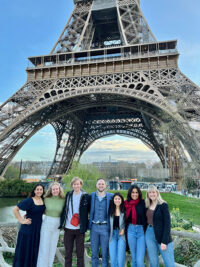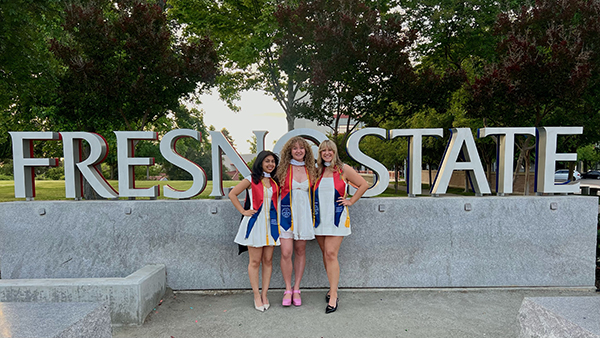Psychology labmates and first-generation college students Caitlin Baten, Amanda Klassen and Gladys Zamora all stayed close to home for their undergraduate and graduate studies at Fresno State — it was comforting, allowed them to master their research skills and to explore the subject matter.

They traveled to Paris as undergraduates to present at a research symposium. A month after that, they were in San Diego at one of the most prestigious psychiatric conferences in the world. Then, they all got accepted into the master’s program at Fresno State, and into Dr. Chris Miller’s Neuroscience of Mood and Anxiety-Related Disorders Lab, or NOMAD, where they would hone in on their respective interests. Their travels continued to Budapest, Madrid and several trips crosscountry for doctoral program interviews.
“It has been my great pleasure and honor to advise these outstanding students and young neuroscientists over the course of their undergraduate and master’s education. Helping to guide and support the scientific and professional growth of aspiring neuroscientists and psychologists like these three stellar students is the reason why we, as faculty, enter and continue in this profession,” said Miller, their mentor and a psychology professor at Fresno State for seven years. “Now, seeing them move on to these remarkable opportunities, which they have worked so hard to achieve, is incredibly rewarding, and I’m thrilled to see what they’ll accomplish in the next phases of their promising careers.”
The trio will graduate with their master’s degrees in psychology during the College of Science and Mathematics commencement ceremony at 8 a.m. Saturday, May 17, at the Save Mart Center. Psychology is the top major among this year’s graduating class with 545 students graduating from the program. The college also has the largest number of graduates with 1,042 students.
Next year, Baten, Klassen and Zamora will each move on to prestigious psychology programs at universities across the country.
Caitlin Baten
Baten is ready to dedicate herself to research. She’s worked two jobs the past two years — one as a teaching assistant, the other as a server in the evenings — in addition to being a fulltime master’s student.
Born and raised in Fresno, Baten started college around age 23, four years after graduating from high school. She earned an associate’s degree in psychology at Clovis Community College and transferred to Fresno State. Psychology was a field that allowed her to understand the complexity of human behavior — communication styles — and how to help people. Baten conducted research on major depressive disorders and differences in brain activations between youth and adults in Miller’s lab, but she’s changing course after graduation.
“I like the idea of researching psychological wellbeing — what helps us to be adaptive and what things can we do that will help us to be resilient against certain stress and psychological disorders,” said Baten, who led a meta analysis project on meditation this year with Dr. Matthew Sacchet, professor and director of the Meditation Research Program at Harvard Medical School and Massachusetts General Hospital.
After several doctoral program interviews, Baten will head to the East Coast where she will continue research on attention and development using neuroimaging methodologies at the University of Connecticut.
“At what other time in my life can I make such a drastic change like this?” Baten said. “It’s almost incomprehensible. I love my community, and I love my labmates and my mentor and my family and everything, even my coworkers. It’s going to be a very bittersweet moment but this is a transitional period into an opportunity for growth and to establish who I am as a researcher and an adult.”
Amanda Klassen
Like Baten, Klassen earned her associate’s degree from community college, but it was in art. She took a year off and moved to Colorado where she explored the idea of making a living as an artist or enrolling at the University of Colorado, Boulder. But her journey led her back to the Central Valley and to the psychology program at Fresno State where she had an interest in applied behavior analysis.
She joined Miller’s lab and the doors of opportunity have been opening since then, said the Reedley native.
“I wouldn’t be going on to a Ph.D. program without Fresno State,” Klassen said. “I think it made a huge difference. It provides a very supportive and safe environment to learn. It is not the flashy school that all your friends want to go to after high school, but I did the community college and Fresno State route, and I think that was the perfect thing to do. I would recommend that to everyone. Stay at your home college. Do college smart, especially because I didn’t know exactly what I wanted to do straight out of high school.”
Klassen studied adults with major depressive disorder and neuroimaging and it grew to include looking at interventions for adults with major depressive disorder. Her thesis was on the use of intravenous and intranasal ketamine on treatment resistant depression.
When it came to applying for a doctoral program, Klassen cast a wide net applying to more than a dozen programs. She found her fit in clinical psychology at Brigham Young University in Utah, where she can research traumatic brain injury in the realm of intimate partner violence.
“It’s kind of crazy to think I’ve lived in California almost my whole life and now, me and my friends, we’re all going on to Ph.D. programs across the states,” Klassen said.
Gladys Zamora
In fifth grade, Zamora wanted to be a therapist. By middle school, she wanted to be a clinical psychologist. As a sophomore at Fresno State, she was introduced to biopsychology, and that transitioned into a love of neuroscience. In Miller’s lab, Zamora researched neural activation patterns that predict antidepressant response in major depressive disorders using meta-analytic tools.
As a first-generation student, Zamora chose to stay close to home at Fresno State to support her family. She is a Ronald E. McNair Scholar, a Sally Casanova Scholar and received a National Institutes of Health Bridges to Doctorate Program fellowship that helped pay for her graduate education.
As an undergraduate, Zamora studied abroad in London thanks to grants from Fresno State, and she participated in her first research symposium with Baten and Klassen in Paris. Zamora traveled to San Diego with the team and presented at two symposiums and later traveled to Budapest and Madrid.
“Fresno State has provided so many opportunities,” Zamora said. “I was able to go to London because of Fresno State and go to Paris for research. It was really exciting. It was the first time I felt like an actual researcher. I was surrounded by a whole bunch of professionals, far into their careers. I got to go with my labmates. It felt nice that we were able to experience that.”
Zamora will take her research experience to the neuroscience Ph.D. program at Virginia Tech, where she will work with Dr. Read Montague whose laboratory focuses on neurochemicals such as dopamine, norepinephrine and serotonin — key neurotransmitters often dysregulated in psychiatric disorders. This work is aligned with Zamora’s goal of identifying the biological underpinnings of these disorders.
“The professors there were just so nice and welcoming,” said Zamora, who applied to several neuroscience programs. “I think they’re doing some really cool research. I’m really interested in addiction work, and I know Virginia Tech has an Addiction Research Center. So, I think having that there is a great opportunity.”
Zamora is open to working in academia or the biomedical industry, but first wants to do some postdoctoral research abroad when she is finished with her doctoral program.





